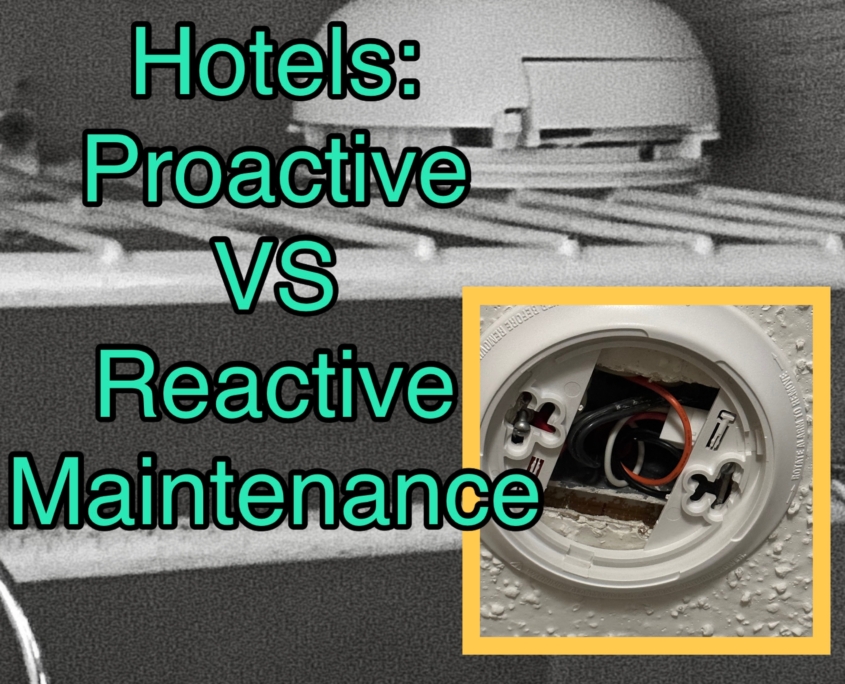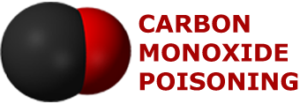Proactive vs Reactive Hotel Maintenance
The hotel industry is plagued by operators who put profits ahead of people in hotel maintenance, using reactive rather than proactive thinking and planning, severely risking guests safety.
By Rebecca Martin
The prime directive for those in the hotel management sector is the safety and wellbeing of their guests. Whether privately owned or part of a large franchise, it is the in interest of the owner(s) to make sure their hotel is being managed by a fully vetted and reputable management team. So, while the management team has the responsibility for the well-being of their guests, the ultimate responsibility lies with ownership.
An important aspect of this relationship is in the hiring of hotel staff. How hiring is handled is prescribed by agreements between ownership and management.

Neglect in hotel maintenance can include such outrageous acts as having this smoke detector removed from the ceiling and put on a shelf in the closet. This is an actual photograph taken in a major hotel chain in June of 2023. The smoke detector was also devoid of batteries.
One thing is surprising when looking at hotel trends. Hotels have cited pandemic lockdowns, travel restrictions and immigration laws as deterrents to adequate hiring post-pandemic. However, economic trends are showing hotels reaching financial heights in 2023 which easily surpass revenues from 2019, pre-pandemic. While all industries took a hit during the pandemic and the economy will take time to fully recover, we are well out the other side and hotels have still cut staff. If there is a shortage of workers, it is better stated as there is a shortage of cheap labor who can be stuck into inflexible schedules in order to maintain an “always on” stream of profitability.
One of the reasons hotels have difficulty hiring staff has nothing to do with employee availability. These workers are moving on to seek out better wages and working conditions. Hotel workers worldwide have rallied against hotels because they claim they are often overworked and traditionally underpaid. In fact, they are the worst-paid in all sectors according to the U.S. Bureau of Labor Statistics. Because of low wages workers are often forced to seek multiple forms of employment. Yet hotels offer little flexibility to enable workers to do so. Other industries have adapted to the current employment situation by offering better wages and/or a greater flexibility to workers. Hotels have been reluctant to adapt to a changing employment climate. This attitude is creating a concerning situation.
Why does a shortage of staff impact hotel safety? Because hotel workers are important allies to hotel maintenance workers. We saw this recently in the carbon monoxide fatalities at the Rancho Pescadero in Mexico. After the tragedy which claimed the lives of two Americans, hotel staff reported that several concerns of gas leaks were reported to hotel management over the course of several months and subsequently ignored. A housekeeper had noticed gas odors in the suite in which the American couple perished, and numerous reports surfaced in the days following the deaths. Hotel staff are often the first eyewitnesses to complaints from guests and problems in the hotel itself. Less staff places a greater burden on maintenance staff to locate and correct problems.
What we often see in the aftermath of carbon monoxide incidents is a reactive response to correct the problem after the fact. This response is called crisis management, or reacting to an event which seriously impacts the hotel’s ability to conduct business as usual. Rather than setting the focus solely on correcting an unsafe situation, this response is spread over public relations and financial issues which might affect the short-term and long-term profitability of the hotel. The hotel’s image is often the first concern. This was the case at the Ranch Pescadero when Hyatt, the parent company, initially issued statements denying that carbon monoxide was present and later were forced to modify their statements to envelope the possibility. The first response was to jump to the defense of the resort in order to preserve the public image. See https://www.latimes.com/world-nation/story/2023-06-16/mexican-resort-dead-californians-gas-leak-warnings#:~:text=Hyatt%20officials%20previously%20said%20they,infrastructure%20or%20a%20gas%20leak.&text=A%20statement%20released%20by%20Hyatt,isolated%20incident%20at%20Rancho%20Pescadero
Profits over People
Post-pandemic, hotel bookings are on the rise, but guest satisfaction is lower than ever. In 2022 guest satisfaction rates were 3.5% lower than in 2019 according to a 2022 Pulse Report. One of the main areas of dissatisfaction was with the physical maintenance of hotels. This includes many areas serviced by hotel maintenance personnel from room locks to HVAC. Guests are unhappier with failures of the machinery than in the service, appearance, and other superficial services than hotels might have guessed based on the number of articles available touting first appearances as the priority when running a successful hotel.
Numerous incidents have occurred over the years in which guests are injured or killed. A well-attended pool area may overshadow the need for pool heater maintenance. Boiler maintenance may fall below room appearance in priority and a friendly staff take precedence over water heater maintenance. Often it is the machinery underneath the surface which is subject to neglect in favor of more superficial concerns. A bad room color never killed anyone, but faulty heaters, especially pool heaters, have.
In this changing employment environment, is there a proactive measure hotels can take to make up for the reduction in hotel staffing? Surprisingly, artificial intelligence-enhanced software is thought to be the solution to maintenance neglect.
In a diagram on the Hotel Speak website, https://www.hotelspeak.com/2022/07/5-maintenance-challenges-hotels-face-today-how-to-deal-with-them/ , we see the progression of responses to hotel maintenance problems
Reactive Hotel Maintenance
First, we have Reactive Hotel Maintenance. We have covered this as the crisis management event. The engine has failed, caused injury, and now must be repaired or replaced. This type of maintenance is often referred to as “run to failure”. If it’s not broke, don’t fix it. This type of scenario is often the most tragic as deaths and injuries which might have been prevented have occurred.
Preventive maintenance would be the maintenance performed by licensed, reputable professionals, on at least an annual basis. Required inspections would also fall into this category. This type of maintenance is designed to prevent unexpected failures in the future.
Condition-based maintenance would cover a wide variety of conditions. It could be a response to deficits indicated in an inspection report or a response to guest complaints or something observed by the staff. A complaint about lack of hot water might lead to the discovery that there is a problem in the system, for instance. It involves monitoring equipment performance, performing tests on equipment and sensor devices, and creating schedules for ongoing maintenance applicable to the current condition of the asset.
Predictive Hotel Maintenance
Predictive hotel maintenance is the examination of the statistics for the timeline of maintenance, repairs or replacement of the engines which run the hotel. Much like condition-based maintenance, it involves monitoring of the machinery during regular operations in order to assess future maintenance needs to prevent failure.
What AI-assisted software might provide is a schedule for Prescriptive Maintenance. Prescriptive maintenance software collects and analyzes data in order to make specialized recommendations for repairs and maintenance in order to reduce or eliminate safety risks or equipment failure. Prescriptive maintenance “not only looks for failure signatures, but also provides information about how to delay or entirely eliminate equipment failure.” https://www.aspentech.com/en/apm-resources/prescriptive-maintenance#:~:text=Prescriptive%20maintenance%20is%20the%20asset,schedule%20and%20plan%20asset%20maintenance.
CCMS is a computerized maintenance management system. There are many versions that can be tailored to individual hotels. It creates maintenance schedules which can be followed, keeps track of who worked on what asset when, and makes sure repairs are completed before a failure occurs.
This appears to a no-brainer for us on the outside looking in. Yet again and again, guests are injured or killed, for a myriad of reasons. Maintenance might be deferred either through ignorance or an unwillingness to pay for it. Maintenance staff that are hired may not be qualified to maintain the assets specific to a hotel or resort or lack the necessary training or licensing. Inspections might consist of a brief visual inspection of only the asset itself and not the venting and other dynamics in play. Equipment may be left in place long past its expected life or refurbished in order to save money.
And, most importantly, after reading so many excellent articles on hotel maintenance concerns, there is one thing which is found lacking and if mentioned, often an afterthought: Carbon Monoxide Detectors. Wherever a hotel falls of the scale of hotel maintenance, the one constant is that carbon monoxide detectors save lives.

Leave a Reply
Want to join the discussion?Feel free to contribute!